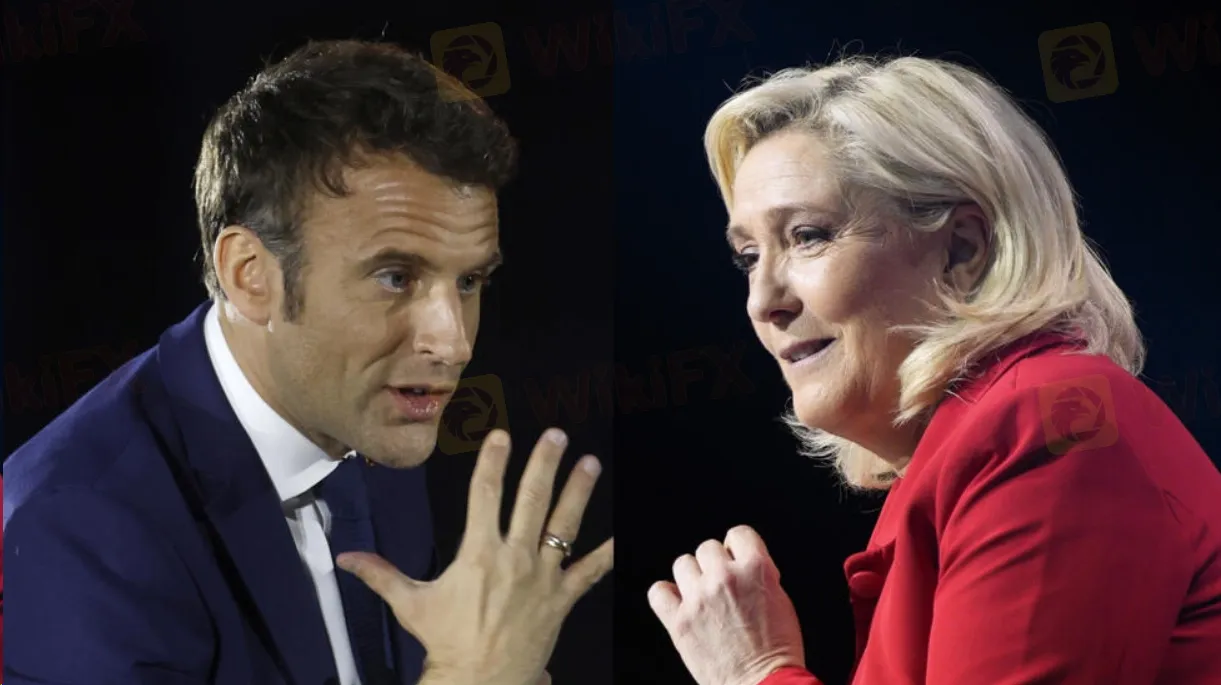简体中文
繁體中文
English
Pусский
日本語
ภาษาไทย
Tiếng Việt
Bahasa Indonesia
Español
हिन्दी
Filippiiniläinen
Français
Deutsch
Português
Türkçe
한국어
العربية
【MACRO Insight】France’s upcoming presidential election is stirring up unrest, with the dual risks of fiscal policy and market crisis looming!
Zusammenfassung:As global attention focuses on the televised debates of the two major parties in the United States, France is also gearing up for its highly anticipated National Assembly elections this weekend amid the turmoil surrounding the upcoming presidential election. President Macron's decision to call for these emergency elections following his party's defeat in the European Parliament elections earlier this month has sparked market chaos. Investors fear that the new government could exacerbate the coun

As global attention focuses on the televised debates of the two major parties in the United States, France is also gearing up for its highly anticipated National Assembly elections this weekend amid the turmoil surrounding the upcoming presidential election. President Macron's decision to call for these emergency elections following his party's defeat in the European Parliament elections earlier this month has sparked market chaos. Investors fear that the new government could exacerbate the country's debt issues. Despite President Macron's call for parliamentary elections, there has been some easing in the selling pressure on French stocks and government bonds, but investors remain cautious ahead of Sunday's vote, concerned about the possibility of a debt crisis.
Opinion polls indicate that the far-right “National Rally” (RN) may secure the most seats, followed closely by the left-wing coalition “New People's Front,” with the centrist alliance ranking third. After the first round of voting, a second round will be held on July 7, potentially resulting in a parliamentary deadlock. The uncertainty surrounding policy commitments has affected the market, with France's blue-chip CAC 40 index facing its worst month since May 2023, with major banks like Société Générale and BNP Paribas seeing their stocks drop by nearly 19% and 11% respectively in June.

Recently, the French government bond market has experienced turbulence, with yields reaching their highest spread over German bonds since 2012. This indicates elevated yield spreads for French bonds, reflecting investor unease ahead of the upcoming legislative elections. Despite some easing earlier this week, the yield spread for French bonds has widened again, highlighting continued market concerns over potential political instability. Since the early announcement of the advance elections, the yield spread between French and German 10-year bonds has reached its highest level in over a decade, as investors perceive lower risk in Germany.
Investor panic has been triggered by spending plans proposed by the National Rally and the New People's Front. According to Theophile Legrand, a strategist at Natixis, market premiums may have increased due to concerns that the National Rally could secure an absolute majority, thereby posing greater fiscal risks. France's current deficit has already exceeded the EU's prescribed limit, with the IMF forecasting it to reach 5.3% of its economic output this year, far surpassing the EU's 3% threshold by 2027.
Viraj Patel, senior strategist at Vanda Research, noted that the National Rally is moderating its policy stance, similar to Georgia Meloni's election in Italy in 2022. However, market attention has recently shifted to the policy proposals of the newly formed left-wing alliance, including raising the minimum wage, freezing prices of essential goods for low-income households, and adjusting income tax brackets. Both factions aim to reverse Macron's previous proposal to increase the national retirement age, although the National Rally has recently shown hesitation and suggested offsetting some expenditures by increasing taxes on the wealthy.

Analysts warn that fiscal proposals from both the left and right wings could trigger a market crisis similar to what UK Prime Minister Theresa Tras experienced in 2022. Tras's tax cuts and decisions not to cut public spending shocked the market, leading to a sharp reaction in the bond market and intervention by the Bank of England. Andrew Kenningham, Chief European Economist at Capital Economics, outlined potential market impacts of the election results, suggesting the best-case scenario would involve a centrist or technocratic government, or significant scaling back of plans by either the National Rally or the New People's Front upon forming a government. The worst-case scenario could see a full-blown bond market and fiscal crisis, potentially widening the French-German 10-year bond yield spread to 300 basis points.
France's debt-to-GDP ratio stands at 110%, historically failing to effectively adjust fiscal deficits. Despite Macron's measures such as pension age reform aimed at reducing debt, public deficits increased in 2023. Investors are more optimistic about the UK before the elections, with Beat Wittmann, Chairman of Porta Advisors, seeing the turbulence in French assets as a buying opportunity.
Analysts at Citigroup warn that in the worst-case scenario, the French stock market could plummet by 20%. If the National Rally or the New People's Front win the election and implement their tax and spending plans, Macron could resign. Citigroup believes a victory by a centrist coalition or a “restrained” right-wing would be most favorable for the market, potentially leading to a 5% increase in stock market values. In a neutral scenario, parliamentary deadlock and ongoing fiscal risks could lead to a 10% decline in price-to-earnings ratios. Regardless of the election outcome, both the French and European stock markets face significant ongoing risks.

German Finance Minister Lindner's statement reflects concerns about potential turmoil in the French bond market post-elections. He emphasizes Germany's stance against European Central Bank intervention, suggesting it could be unlawful and might provoke economic and constitutional issues. The Chief Investment Officer at Allianz Global Investors also expresses worries about French bonds, urging French officials to assure foreign investors of the country's fiscal stability to prevent another round of sell-offs. Given the substantial holdings of French bonds by overseas investors, there's apprehension that current political turbulence could echo the European debt crisis of over a decade ago.
Haftungsausschluss:
Die Ansichten in diesem Artikel stellen nur die persönlichen Ansichten des Autors dar und stellen keine Anlageberatung der Plattform dar. Diese Plattform übernimmt keine Garantie für die Richtigkeit, Vollständigkeit und Aktualität der Artikelinformationen und haftet auch nicht für Verluste, die durch die Nutzung oder das Vertrauen der Artikelinformationen verursacht werden.
WikiFX-Broker
Aktuelle Nachrichten
Ich war auf der billigsten und der teuersten Kreuzfahrt derselben Reederei – das waren die größten Unterschiede
Solaris: Weiteres Millionen-Funding noch dieses Jahr – auch Verkauf steht im Raum
KI-Blase, Milliarden-schwere US-Konkurrenz – warum DeepLs Jarek Kutylowski trotzdem keine Angst hat
Volocopter: Laut Bericht steht das Flugtaxi-Startup kurz vor einer Übernahme aus China
Nur 100 Euro im Monat: So habe ich 4000 Euro Gewinn in 5 Jahren mit einem ETF-Depot für meine Kinder gemacht
Ethereum: Deflationstrend und ETF-Euphorie könnten Rallye entfachen
85 Prozent Plus in einer Woche: Die 5 größten Altcoin-Gewinner im Bitcoin-Boom
Ripple XRP: Die Rally nimmt Fahrt auf – warum der Kurs jetzt explodiert
Ethereum: Rekordzuflüsse bei ETFs und Risiken durch unstaked ETH – Wohin geht der Kurs?
Statt in den Ruhestand zu gehen, kauften meine Frau und ich eine Pension: Es half uns, einen neuen Lebenssinn zu finden
Wechselkursberechnung


